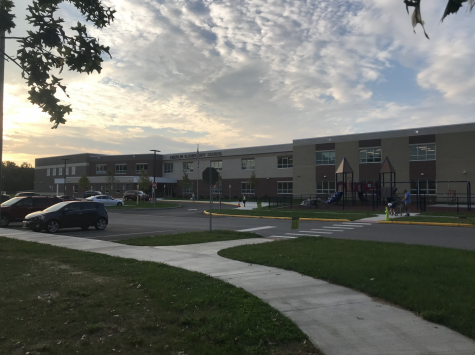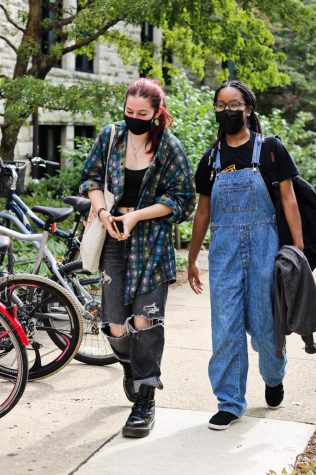Conservatory Adjusts Curricular Requirements Following Transition to Remote Campus
Bibbins Hall, which holds the Conservatory’s main classrooms, is currently closed to students following Oberlin’s transition to a remote campus.
Following Oberlin’s transition to a remote campus in the wake of the ongoing health crisis, the Conservatory has had to adapt their curriculum including private lessons, ensembles, and culminating recitals to an online platform. The Conservatory has adjusted some of their requirements and set flexible guidelines for students in order to accomodate for the variety of departmental and individual circumstances.
This semester, to account for extenuating circumstances due to COVID-19, the deadline for declaring Pass/No Pass in a course has been extended until May 8 for both the College and the Conservatory. The Conservatory has also waived limitations which restricted students from declaring Pass/No Pass for Music Theory I-IV, Aural Skills I-IV, and Introduction to the History and Literature of Music.
In addition to these adjustments, deans and faculty have also had to devise ways to account for a variety of classes and requirements necessitating performance, sustained practice time, and private lessons. Conservatory administration has intentionally left options open for faculty to define what constitutes full credit this semester.
“Some of the context for [these decisions] of course is that in the [Conservatory] … there’s already a fair bit of variance department by department, division by division, even around commonly held requirements,” Dean of the Conservatory William Quillen said. “There’s a general framework, but then departments and divisions [can] tailor that on the basis of the needs of their students.”
In their first two years at school, all Conservatory departments require some form of review or jury to evaluate student’s learning. Students also have to complete a junior and senior recital during their time at Oberlin. This spring, 110 senior recitals and 41 junior recitals in the Conservatory will no longer be held on campus following Oberlin’s transition to remote learning.
Students graduating this spring don’t have the option of postponing their recital until the fall, and so canceled performances present a distinct challenge. Determining how to proceed with recitals was a high priority for deans, but the realities of student’s widely varying circumstances led them to leave options largely open to departmental jurisdiction.
“Some students are doing events with Facebook Live or Zoom to stream out live performances,” said Senior Associate Dean for Academic Affairs Peter Swendsen, OC ’99, who chairs the Conservatory’s Educational Policy Committee. “Some are submitting recordings. Some obviously have decided, in consultation with their teacher, that it does make better sense to postpone until the fall if they just literally don’t have the instruments they need, for instance. Others are doing different versions of this altogether [such as] some written documentation or something we might think of as a podcast.”
Conservatory fourth-year Rachel Gibson, who majors in both Technology in Music and Related Arts and Percussion, found her plans radically altered after moving online. Having scheduled her two recitals for the same weekend in May so that her family could attend both, she is now at home in Pennsylvania reworking these projects.
“Because the [TIMARA] program is so invested in technology, we found some creative ways to work around that,” she explained, citing new requirements to upload photos, audio, or visual files to Google Drive for faculty review. “For the percussion major part, it’s tough because … not many students in our department have access to [these large], high quality, nice instruments. … It does take away from the learning experience for sure.”
Since a large marimba, which she does not have access to at home, figured heavily into Gibson’s recital plans, she will be writing a piece for next year’s percussion ensemble to perform instead.
“Faculty have been … on the whole pretty excited and enthusiastic by the variety of options that are available to the students,” Swendsen said.
In addition to music lessons and recitals, many students are also enrolled in ensembles — two credit courses that involve hours of work every week — which have been significantly adapted so students can fulfill their course requirements.
Director of Contemporary Music Ensemble Timothy Weiss and Division of Conducting and Ensembles Director Raphael Jimenez teach over 200 students in their instrumental ensembles. Each ensemble normally produces three performances in a semester. While for this semester many students who have already participated in one performance were deemed to have received full credit, those who have not will complete alternative coursework from home to satisfy their requirements. Around half of Weiss’ students who have yet to complete their ensemble credit are graduating seniors who were busy with graduate program auditions earlier this semester.
“For those students, we created an audition list that would be basically standard for any professional ensemble audition, and asked them to make a video recording and upload it to Blackboard so that we can review it,” Weiss explained. He also added that they have been open to tweaking these lists for students who would prefer to work on pieces more specifically related to their areas of interest.
Division of Jazz Studies Director and Professor of Jazz Guitar Bobby Ferrazza conducts three jazz ensembles, two of which have not satisfied the requirements of the ensemble course by COVID-19-modified standards.
“One group chose a collaborative remote recording project, and the other ensemble chose independent projects that vary significantly from transcription and analysis studies, individual recording, in-depth instrument focus, ear training projects and so on,” Ferrazza wrote in an email to the Review.
Lack of access to equipment, space, and technology has made it difficult for some students to get their work done and practice their instruments. Double-degree second-year Ohad Nativ, a Piano performance and Mathematics major has returned home to the New Jersey metro area to significantly restructured classes, many of which no longer meet regularly.
“While I do have a piano at home, I cannot practice outside of a small time window (at best between 6 to 10 PM), so [as] to not disturb any family members,” wrote Nativ, whose entire family is working and schooling from home. “This I found very restricting, almost halving my usual daily practice. Furthermore, due to quarantine restrictions, I was not able to get my piano tuned, which limits practice effectiveness.”
While his private lessons have continued into this semester, the many performances Nativ was rehearsing for have been canceled or postponed. Postponement raises another concern — he worries that work carried over from his second year, including his jury assessments, will create more stress next fall.
Remaining on campus can pose its own barriers. Of the 250 students remaining on campus at the beginning of this week, 63 were Conservatory students, 53 of whom were F-1 visa holders. Approximately three dozen of the students living in College housing after March 18 were pianists, and after Governor DeWine’s stay-at-home order a concerted effort by the Office of the Conservatory Dean, Concert Production Office, Division of Student Life, Campus Safety, Keyboard Studies, and Piano Technology was made to deliver 14 Steinway & Sons pianos to dorms and accessible campus locations like Wilder Hall.
“There are rooms on the first floor of Wilder designated as practice spaces to which Conservatory students have access on a reservation basis,” Assistant Vice President of Student Life Adrian Bautista wrote in an email to the Review. “The lower level and first floor of Wilder (and International Student Resource Center) remain accessible during designated hours for essential business and operations respective of the Governor’s stay-at-home order.”
Weiss explained that the Conservatory is also prioritizing the delivery of high-quality AKG microphones to remote students who are having difficulty recording music or participating in Zoom meetings. Weiss himself has tried to innovate his teaching practices by sending compositions to students he coaches in chamber music for them to build on individually, as a way to keep up their creative connection.
These changes, while making the best of the situation’s limits, are standing in for what would normally have been a spring semester boasting hundreds of concerts by students, guests, faculty, and ensembles.
“When I’m talking to prospective students or reminiscing with alumni, one of the things we always talk about is weekend nights in April, when … you are passing each other in Tappan, going between senior art shows, and dance events in Warner, and concert events in the Con,” Swendsen said. “That’s one of the heartbreaking missed opportunities this year for me, is losing those nights in April when that transpires all across campus.”
In an attempt to make up for some of these lost performances, the Conservatory unveiled Oberlin Stage Left this week, a program that will provide access to online screenings, performances, and conversations — some by guests, some by Conservatory staff — that might normally take place as on-campus events. As the website reads — “there’s one stage left, and we’re making the most of it!” The first concert, featuring Assistant Professor of Harp Yolanda Kondonassis, will launch next Tuesday.
While some peer institutions chose to cancel student recitals and waive significant degree requirements, Oberlin deans decided against taking those measures, citing a desire for remote Conservatory curricula to still feel emblematic of an Oberlin education.
“As we thought about how to provide updated guidance and requirements, I think we really had our prospective students in mind,” Swendsen said. “It’s this time of year where we’re talking them through what [it] will be like if they come to Oberlin, and at the same time we were making these decisions about people who are in their final semester at Oberlin. We wanted those things to resonate with each other.”








